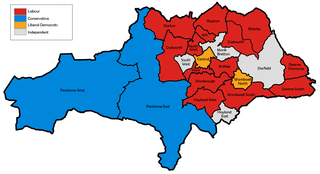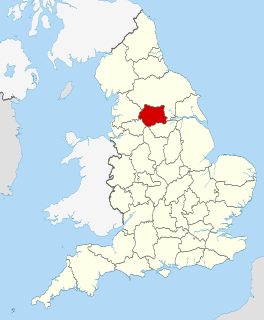
The City of Wakefield is a local government district in West Yorkshire, England, with the status of a city and metropolitan borough. Wakefield is the district's administrative centre. The population of the City of Wakefield at the 2011 Census was 325,837. The district includes the "Five Towns" of Normanton, Pontefract, Featherstone, Castleford and Knottingley. Other towns include Ossett, Hemsworth, South Kirkby and Moorthorpe and South Elmsall. The City and borough are governed by Wakefield Metropolitan District Council. Wakefield lies between Leeds and Barnsley

Wakefield is a constituency created in 1832 represented in the House of Commons of the UK Parliament since 2005 by Mary Creagh, a member of the Labour Party.
Leicester is a unitary authority in Leicestershire, England. Until 1 April 1997 it was a non-metropolitan district. Since 2011 it has also had a directly elected mayor.
Kirklees is a metropolitan borough of West Yorkshire, England. One third of the Council is elected each election year. Every fourth year there is no election. Since the last boundary changes in 2004, 69 councillors have been elected from 23 wards.
Elections to Durham County Council are held every four years. The council was created as part of the 1972 local government reforms. The first elections to the new authority were held in 1973 in advance of the council taking office in 1974. As part of changes to local government in 2009, the council became a unitary authority with the first elections to the new council taking place in 2008. Since becoming a unitary authority, 126 councillors have been elected from 63 wards.

Sefton Council is the governing body for the Metropolitan Borough of Sefton in Merseyside, north-western England. The council was under no overall control from the 1980s until 2012 when the Labour Party took control. It is a constituent council of Liverpool City Region Combined Authority.
The 1998 Wakefield Metropolitan District Council election took place on 7 May 1998 to elect members of Wakefield Metropolitan District Council in West Yorkshire, England. One-third of the council was up for election and the Labour party kept overall control of the council.

The 2002 St Albans City and District Council election took place on 2 May 2002 to elect members of St Albans District Council in Hertfordshire, England. One third of the council was up for election and the council stayed under no overall control.
The 1999 Wakefield Metropolitan District Council election took place on 6 May 1999 to elect members of Wakefield Metropolitan District Council in West Yorkshire, England. One third of the council was up for election and the Labour party kept overall control of the council.
The 2002 Wakefield Metropolitan District Council election took place on 2 May 2002 to elect members of Wakefield Metropolitan District Council in West Yorkshire, England. One third of the council was up for election and the Labour party kept overall control of the council.
The 2003 Wakefield Metropolitan District Council election took place on 1 May 2003 to elect members of Wakefield Metropolitan District Council in West Yorkshire, England. One third of the council was up for election and the Labour party kept overall control of the council.
The 2004 Wakefield Metropolitan District Council election took place on 10 June 2004 to elect members of Wakefield Metropolitan District Council in West Yorkshire, England. The whole council was up for election with boundary changes since the last election in 2003. The Labour party stayed in overall control of the council.

The 2006 Wakefield Metropolitan District Council election took place on 4 May 2006 to elect members of Wakefield Metropolitan District Council in West Yorkshire, England. One third of the council was up for election and the Labour party kept overall control of the council.

The 2007 Wakefield Metropolitan District Council election took place on 3 May 2007 to elect members of Wakefield Metropolitan District Council in West Yorkshire, England. One third of the council was up for election and the Labour party kept overall control of the council.

The 2008 Wakefield Metropolitan District Council election took place on 1 May 2008 to elect members of Wakefield Metropolitan District Council in West Yorkshire, England. One third of the council was up for election and the Labour party stayed in overall control of the council.

The Leeds City Council election took place on 1 May 2003 to elect members of City of Leeds Metropolitan Borough Council in West Yorkshire, England. One third of the council was up for election and the Labour party stayed in overall control of the council.

The 2000 Solihull Metropolitan Borough Council election took place on 4 May 2000 to elect members of Solihull Metropolitan Borough Council in the West Midlands, England. One third of the council was up for election and the Conservative party gained overall control of the council from no overall control.
The 2000 Sandwell Metropolitan Borough Council election took place on 4 May 2000 to elect members of Sandwell Metropolitan Borough Council in the West Midlands, England. One third of the council was up for election and the Labour party stayed in overall control of the council.

The 2000 Barnsley Metropolitan Borough Council election took place on 4 May 2000 to elect members of Barnsley Metropolitan Borough Council in South Yorkshire, England. Prior to the election, Labour has suffered a by-election loss in South West and two defections to Independent. One third of the council was up for election and the Labour party stayed in overall control of the council.













